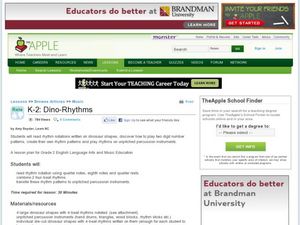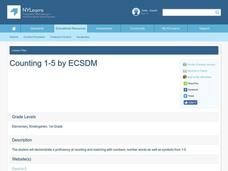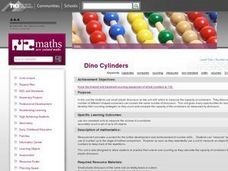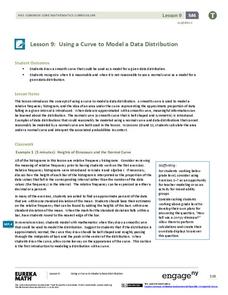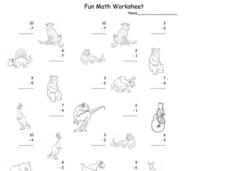Curated OER
Cool Math
Young scholars benefit from the correctly selected book for a specific math concept. In this book selection instructional activity, students are given a list of books related to specific math concepts. Young scholars' ages...
Curated OER
K-2: Dino-Rhythms
Second graders read rhythm notation and combine four-beat rhythms. In this rhythms lesson, 2nd graders read quarter notes, eighth notes, and quarter rests in rhythms that are written on dinosaur shapes. They clap, snap, or stamp out the...
Curated OER
Activity Plan 5-6: Book-Character Homes
Young scholars use their creativity to build character homes. In this early childhood lesson plan, students develop creative-thinking, social, language, math, and motor skills as they work together to create buildings for characters from...
Curated OER
Counting 1-5
Students explore numbers by participating in basic counting activities. In this early math lesson, students identify the numbers between 1 and 5 and read several books that demonstrate early counting. Students practice counting to 5 on...
Curated OER
Three Digit Addition
In this math worksheet, students solve three digit addition problems. Some of the addition problems require regrouping. The problems are set up to solve vertically.
Curated OER
Problem Solving: Use a Graph 3
For this math problem solving worksheet, students examine a graph based on books read and use it to solve 2 problem solving questions and a test prep question.
Curated OER
Single Digit Addition
In this addition worksheet, students find the sums in 15 single digit problems, regrouping as needed. They see black line pictures of dinosaurs and animals on the page.
Curated OER
Basic Subtraction Facts
In this basic subtraction facts activity, students problem solve and calculate the answers to twenty subtraction equations. Students double-check their answers with their classmates.
Curated OER
Discovering Fossils
Students dig for and discover fossils in a classroom setting. They dig on a tarp to find, map, assemble, and photograph their discoveries.
Curated OER
Food chains at sea
Fifth graders interpret a table of data about food chains in the ocean. They create a food chain to represent the information on the table. Periwinkles eat seaweed, and crabs eat periwinkles - so who eats crabs? Extend the activity with...
Curated OER
Dino Cylinders
Students investigate the capacity of containers using small dinosaur figures as the unit of measure. They work with a number of different shaped containers to compare the capacity as they practice counting the dinosaurs. They complete an...
Curated OER
History of Our Solar System Time Line
Ninth graders explore the concept of ratios. In this ratio lesson, 9th graders construct a to scale time line that starts at the beginning of time. Students determine the correct placement of big events in time such as when the dinosaurs...
Curated OER
Ten Pennies
Students play logic and strategy games with pennies. In this pennies worksheet, students play one game called 'From counting to arithmetic', and one called 'Counting and mental math'.
Curated OER
Galaxies and the Universe
If Earth was formed 4600 million years ago, and the sun revolves about the center of the Milky Way once every 250 million years, how many revolutions have occurred? Learners answer this question and ten more, all providing students with...
Curated OER
Dragon Math
Third graders, in groups, practice multiplication by putting five multiplication problems on white scales, then the answers on florescent colored scales.
National Security Agency
Equations and Expressions
Learners demonstrate their knowledge pictorially, concretely, and abstractly in this unit meant to last three hours over three days. Using hands-on activities, manipulatives, real-world applications, and problem...
Curated OER
Measuring Angles
Solve and complete 18 problems about angles. First, demonstrate that each conjecture is false by giving a counterexample. Then write the inverse, contrapositive, and converse for the each statement. In addition, write a...
EngageNY
Using a Curve to Model a Data Distribution
Show scholars the importance of recognizing a normal curve within a set of data. Learners analyze normal curves and calculate mean and standard deviation.
Curated OER
Basic Subtraction Fact Worksheets to 20
Print this worksheet and have your helper pass it out. The class can use it to practice subtracting single and double-digit numbers up to 20. Some borrowing is required.
Curated OER
Written and Oral English language conventions: Independent Practice
Sit or sat? Passed or past? Assess your pupils’ mastery of verb usage with 10 multiple choice questions. Learners must select the correct sentence from the listed four options.
Curated OER
Written and Oral English Language Conventions: Independent Practice
Sit/set, past/passed, except/accept, rise/raise, lie/lay. Are some of your pupils still misusing these verbs? Here are 10 multiple choice prompts that will provide them with extra practice. The worksheet could be used in class or as...
Curated OER
Beginning Subtraction
In this subtraction worksheet, students find the differences in 15 problems with numbers up to 10 in which they do not have to regroup. They see black line pictures of dinosaurs and animals on the page.
Curated OER
Basic Subtraction Facts: Missing Blanks
In this math worksheet, students solve 20 subtraction problems in which there is a missing number in each. Students use the number line to fill in the missing number in each problem.
Curated OER
Applied Science - Science and Math Pre - Lab (Scientific Method)
Students examine science. For this scientific method lesson, students are introduced to what every experiment contains (hypothesis, critical thinking) and how an experiment is conducted. They watch a demonstration and then work...



